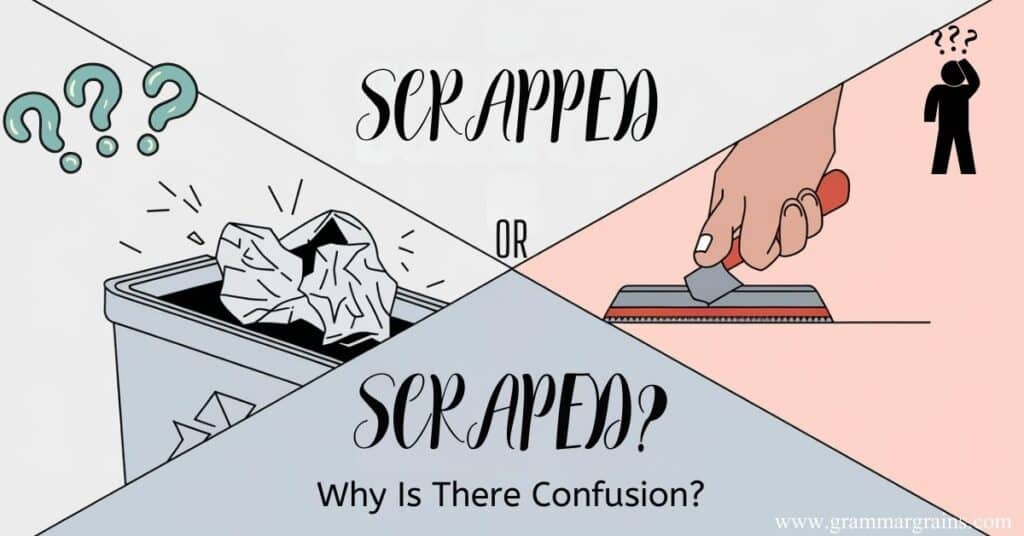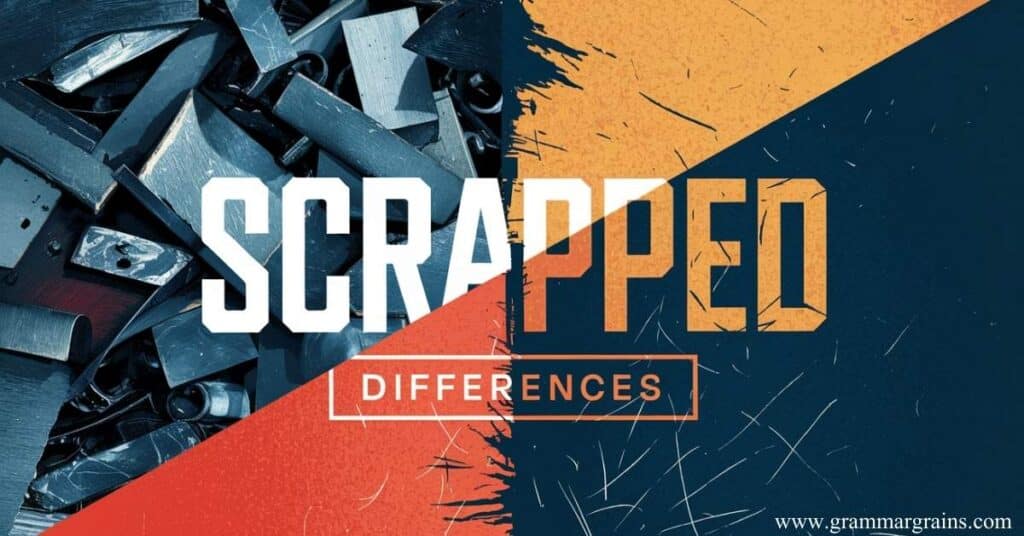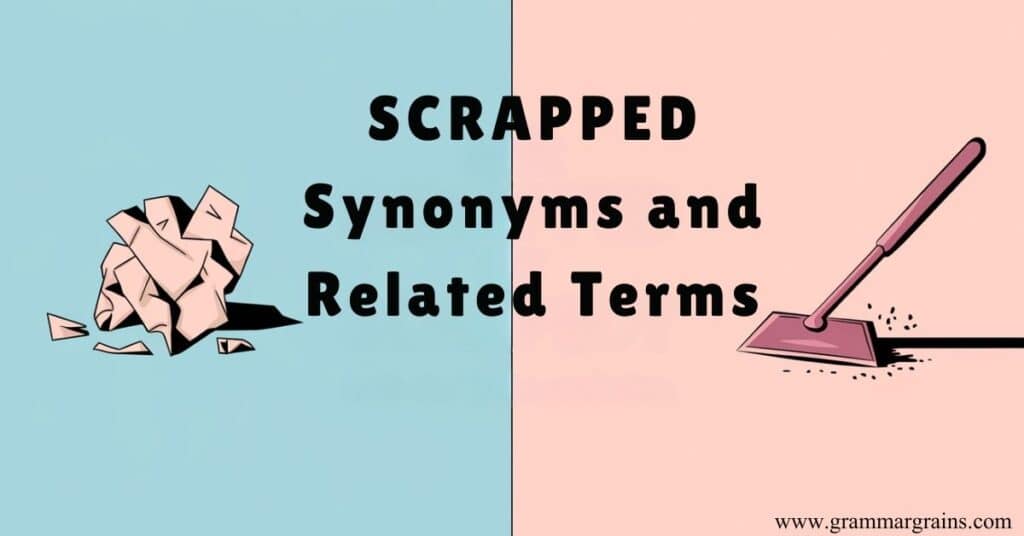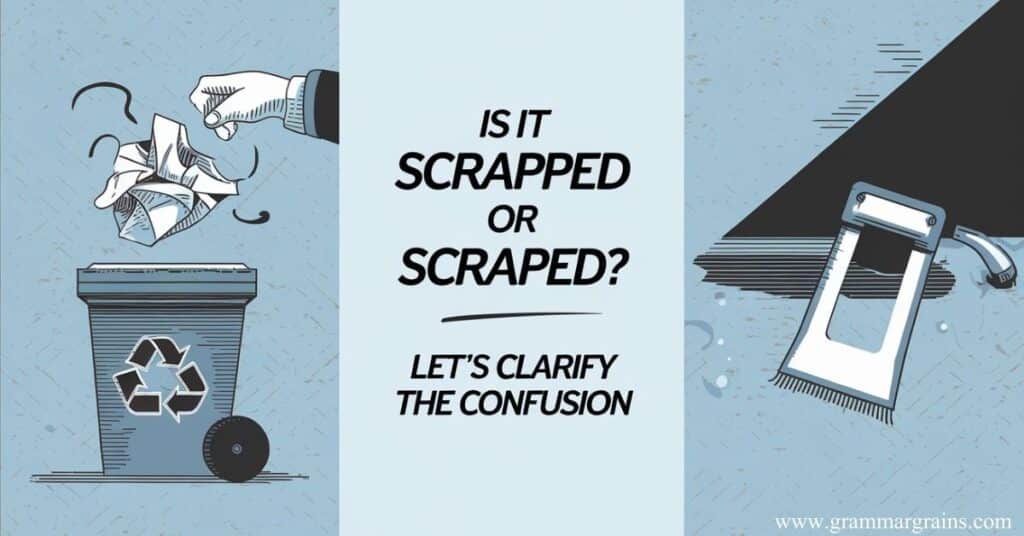Knowing whether to use scrapped or scraped can instantly elevate your clarity in writing and speech. While these words sound similar and often get mixed up, their meanings differ significantly.
The word scrapped means someone has discarded, rejected, or abandoned something.
Have you ever scrapped a big idea or scraped through a tough situation? Such scenarios highlight why this confusion persists.
Why Is There Confusion?

People often mix up scrapped and scraped because their pronunciations and spellings overlap.
Both derive from verbs—scrap and scrape—but their uses and meanings couldn’t be more distinct.
For example, when someone says, “The team scrapped their project,” it could easily sound like, “The team scraped their project.”
The misunderstanding deepens in spoken conversations, especially when spoken quickly or casually. This confusion also pops up in professional settings. A manager might say, “The proposal was scrapped,” meaning it was abandoned. But if someone hears “scraped,” they may imagine something entirely different, like a physical action. Recognizing these nuances helps avoid miscommunication.
What Does “Scrapped” Mean?
Scrapped means discarded or abandoned, while scraped refers to removing material or narrowly achieving something.
Understanding these distinctions isn’t just about avoiding errors—it’s about mastering precise communication.
People use it when they stop pursuing plans, ideas, or projects.
For example, a tech company might announce, “We scrapped the new app due to a lack of user interest.”
This action represents a decisive end to the project.
The word scrapped comes from “scrap,” which originally referred to a discarded fragment or leftover piece.
Over time, the term expanded to mean getting rid of anything unnecessary or unwanted.
Now, people often use it figuratively to describe the act of abandoning big initiatives or plans.
For instance, when someone says, “The government scrapped its infrastructure proposal,” they mean officials decided the plan wasn’t feasible.
In essence, scrapping suggests making a final decision to let something go.
What Does “Scraped” Mean?
The word scraped refers to the physical act of removing material from a surface.
This removal happens through actions like rubbing, scratching, or brushing off. For instance, you might scrape the ice off your windshield on a frosty morning.
Similarly, when cleaning a floor, you scrape away grime to make it spotless.
The roots of scraped trace back to Old English. Initially, it described actions like rubbing or scratching to remove debris or layers of dirt.
Over time, it evolved to cover both literal and figurative uses. For example, students who just barely pass their exams might say, “I scraped through,” to highlight their narrow success.
These uses show that scraped often implies effort, whether physical or metaphorical. Consider the sentence, “She scraped the mud off her boots before stepping inside.”
Here, scraped clearly describes a removal process that leaves no residue behind.
“Scrapped” vs. “Scraped”: Differences

Although these words sound alike, their meanings and applications diverge sharply.
Let’s compare their key differences:
| Aspect | Scrapped | Scraped |
|---|---|---|
| Definition | Abandoned or discarded | Removed material or marked a surface |
| Verb Form | Past tense of “scrap” | Past tense of “scrape” |
| Usage | Refers to projects, ideas, or plans | Refers to physical or figurative actions |
| Nuances | Suggests rejection or cancellation | Suggests abrasion or minimal achievement |
For example, when a company scraps a project, it decides the project has no future.
On the other hand, if someone scrapes a surface, they physically remove dirt, paint, or another material.
Understanding these differences ensures precise communication in both casual and professional contexts.
Contextual Usage with Examples
People commonly use scrapped when discussing canceled projects or rejected ideas.
For instance, when a film studio decides not to pursue a movie, they might say, “We scrapped the script due to poor audience interest.”
This usage applies to anything abandoned because it’s no longer practical or necessary. The scrapped Mars mission is a famous example.
NASA had to abandon certain Mars exploration projects due to budget constraints, showcasing how the term applies in major decisions.
In contrast, scraped appears in contexts involving physical actions or efforts.
You might say, “I scraped the burnt bits off the toast,” describing the removal of unwanted material.
Scraped also works figuratively: “He barely scraped through his exams” conveys that success came with difficulty.
In both cases, scraped emphasizes a process or struggle, whether physical or metaphorical.
Synonyms and Related Terms

Synonyms for scrapped include abandoned, discarded, canceled, and rejected.
These words highlight the act of giving up on something deemed unnecessary or unworkable.
For example, “The startup discarded its original business model” carries the same meaning as “scrapped.”
For scraped, synonyms like abraded, rubbed off, brushed, and rasped are more fitting.
These terms describe physical actions involving surfaces or materials.
For instance, “He brushed the dirt off the old painting” mirrors the meaning of “scraped.”
Recognizing these synonyms not only broadens your vocabulary but also sharpens your ability to express specific ideas.
Real-World Applications
In the real world, people frequently use scrapped in business and project management.
Companies scrap ideas or initiatives when they no longer align with goals or budgets. For example, “We scrapped our plans to open a new branch due to low market demand” reflects a calculated decision to abandon a costly project. Conversely, scraped finds its place in everyday tasks and figurative expressions.
A construction worker might say, “I scraped the paint off the walls to prepare for a new coat,” referring to a physical action.
In a figurative sense, students might admit, “I barely scraped through that tough class,” emphasizing a narrow success.
These real-world uses highlight the word’s versatility.
Fun Additions
In pop culture, you’ll often find characters who scrap grand plans after running into trouble.
For example, in action movies, heroes might scrap a flawed strategy at the last moment to save the day.
Similarly, the concept of “scraping by” shows up frequently in stories about survival or tough odds.
A character might say, “I scraped by on minimum wage,” highlighting the effort required to stay afloat.
You can practice using these words with exercises like:
- “The artist scrapped her original design and started fresh.”
- “He scraped the rust off the bicycle to make it usable again.”
These examples let you apply the correct word in context, making their meanings stick.
Conclusion
Despite their similarities, scrapped and scraped carry distinct meanings. Use scrapped when you want to describe something that’s been abandoned, like a canceled project.
Use scraped when referring to physical actions like removing dirt or achieving something with difficulty.
Learning these differences improves your writing and speaking clarity, whether you’re discussing business decisions, everyday tasks, or personal challenges.
FAQs
What’s the difference between scraped and scrapped?
Scraped involves removing material or barely succeeding, while scrapped means abandoned or discarded plans.
What does it mean to get scraped?
Getting scraped refers to experiencing abrasion or having material removed from a surface.
What is the meaning of being scrapped?
Being scrapped means being abandoned, rejected, or canceled, often in the context of plans or projects.
What does “scraped off” mean?
“Scraped off” describes the action of removing material from a surface, such as dirt, paint, or ice.

Taila Lucy, an expert content writer at Grammar Grains, brings 4 years of experience crafting engaging pieces on grammar. Her work delves into synonyms, antonyms, slang, puns, and poetry, helping readers master English with creativity and flair.






